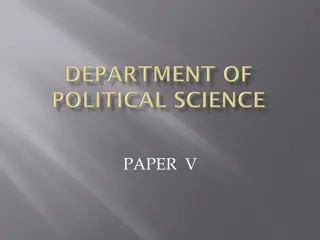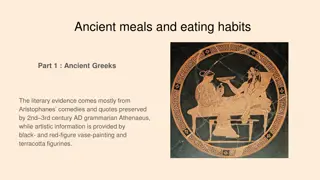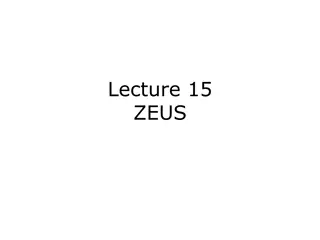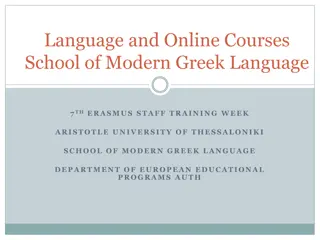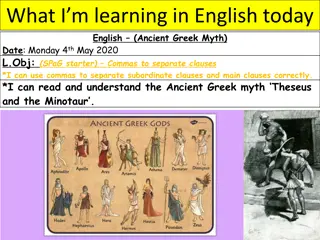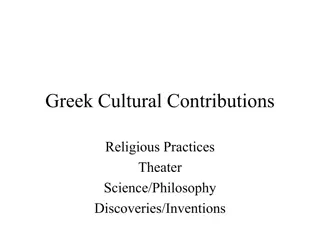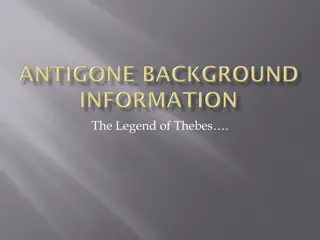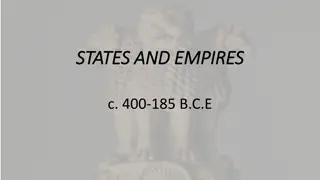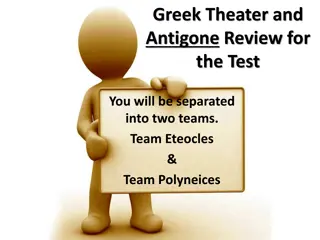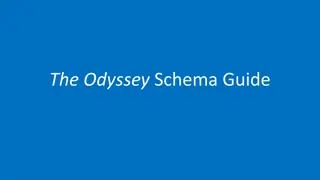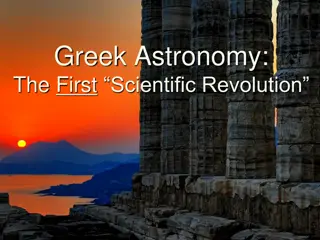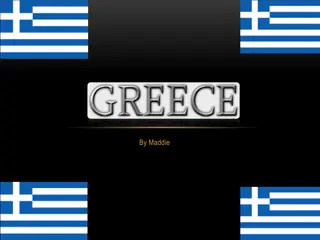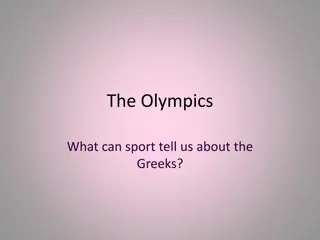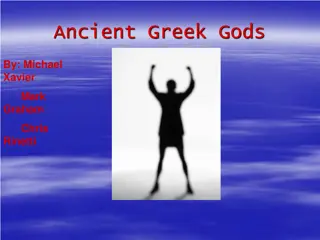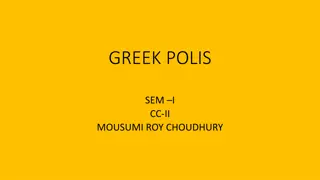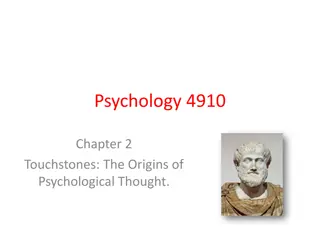Ancient Greek Political Thought Overview
Explore the foundations of Ancient Greek political thought through topics such as the concept of Polis, social classes, citizenship criteria, key institutions, historical background including Draconian laws and Solon's reforms. Gain insights into the structure of society and the evolution of democratic principles in Ancient Greece.
Download Presentation

Please find below an Image/Link to download the presentation.
The content on the website is provided AS IS for your information and personal use only. It may not be sold, licensed, or shared on other websites without obtaining consent from the author. Download presentation by click this link. If you encounter any issues during the download, it is possible that the publisher has removed the file from their server.
E N D
Presentation Transcript
Faculty of Economics and Administrative Sciences Department of Economics ADM201 History of Political Thought I Research Assistant Sefa MERTEK
Ancient Greek ADM201 History of Political Thought I Week 1
What is Polis? City Center Agricultural Fields
Polis aims to be perminant. provides security and trade. is the space where the citizens made themselves.
Social Classes 1. Citizens Have liberty, rights. In order to be a citizen, one have to have some age (20) and some property (land). 2. Foreigners (Meteikos) free people dealing with trade and craft. 3. Slaves Have no rights and liberty.
Citizens 1. Eupatrids: Have big lands. 2. Demiurgois: Middle class who make trade and craft. 3. Georgois: Peasents who have small lands. 4. Thetes: Workers who does not have any property and jobs.
Instutions Ekklesia: Council of People Bule: Council of Four Hundred Heliaia: Public Courts Areopagus High Managers
Historical Background 1. Drakon Law (624 BC) Thesmoi (Divine Law) Nomoi (Human Law) Severe criminal laws Citizens gained a legal personality. Laws became applicable to all citizens.
2. Solon (594 BC) sonomia: Equality before the law The principle that a person born from a free father cannot be made a slave has been adopted. Abolishing debt slave.
Citizens are divided into four classes according to wealth criteria, not nobility: 1. Pentakosiomedimnos: Those with 500 medimnos wheat / wine / olive oil income 2. Hippeis: Those with 300-500 medimnos wheat / wine / olive oil income 3. Zeugites: Those with 200-300 medimnos wheat / wine / olive oil income 4. Thetes: Those with 0-200 medimnos wheat / wine / olive oil income
3. Pesistratos (560-527 BC) It is a tyrant who has made a coup with the support of the people. He did not touch the laws of Solon and continued his administration within a legal framework. The tyrant's difference from the king is not that he has absolute power, that he obtained it in illegal and unconventional ways and continued arbitrarily.
He provided peace outside and economic development inside. He followed an economic policy prioritizing the poor. He distributed the land of the polis to the poor, provided that they gave him 1/10 of the income. He established a sea fleet. After his death, his sons, Hipparkhos and Hippias, tried to establish dynasteia but failed.
4. Kleisthenes (507 BC) a tyrant eliminated the old tribal organization, which gave the nobility a privileged place in the political life of the polis. divided the citizens into 10 tribes that were geographically separated instead of the 4 tribes based on the lineage. made bule Council of Five Hundred. gave ostrakismos (ten years exile) authority to ekklesia.
5. Phases of Democracy Between 490-479 BC Ancient Greeks (Attic Delos Sea Pact-300 Greek Polis) made war with Persians and defeated them. Instead of selecting the arkhons by ekklesia, it was chosen to be chosen by lot among 500 people chosen by the demes. Commanders began to be effective in management. Pericles Tenancy, which are closed to the lower classes, became public.
Attic Delos Sea Pact, came under the sovereignty of Athens in time. Athens carried the Union's wealth to Athens. Pericles who is strong supporter of democracy came to power between 446-429 BC. He tried to increase political participation. He added isegoria (equality in speech) principle and isokratia (equally participation to political life). Athens went on to impose democracy on other polises, resulting in clashes between polises. Because some polises wanted to be ruled under oligarchy.
Athens and Spartians made Peloponnesos War between 431-404 BC. Spartians defated Athens and established Rule of Thirties/Tyranny of Thirties. But in 403 BC, Athenain democrats abolished Rule of Thirties and adopted democract again.
Philosophy of Ancient Greek 1. Philosophy of onia moved from matter and found the principles explaining the order of the universe in natural forces. Thales: First reason,arkhe, of everything is water. Anaksimandros: Arkhe is aperion which means limitless and uncertain. For him, matter is in constant motion.
Anaksimenes: Arkhe is air. Herakleitos: Arkhe is fire. everything is in a process of existence, change and transformation. So he said that it is not washed twice in the same river. This constant change in the cosmos is the product of the conflicts of opposites with each other. He defends dialectic.
2. Philosohophy of Southern Italy Pythagoras: Arkhe is number. People consists of three elements that is mind, soul and desire. Elea School Ksenophones: One God. Parmenides: Opposite of Herakleitos.
3. Nature Philosophers of Democracy Empedokles: Principles of Cosmos are water, air, fire and earth. Anaksagoras: he argues that there are an infinite number of constituents and calls them sperma. Motion happens with nous. Demokritos: there are infinite and moving atoms in space. With the motion, the atoms become new by moving.
Sophist Thought Sophist means wise and rhetoric master. Sophists are people who deal with practical life issues and question and criticize traditional value judgments. According to the sophists, the purpose of philosophy is to understand man and help him in daily life.
First Generation Sophists Protagoras, Prodikos, Gorgias, Hippias They put man at the center of thought. There are no absolute knowledge. Because knowledge is the belief that consists of perceptions (doksa) provided by the senses. They put forward the intellectual foundations of individual utilitarianism. Rhetoric and dialectic.
Second Generation Sophists Antiphon, Euthydemos, Kallikles, Kritias, Thrasymakhos They used rhetoric and dialectic for fight. Polis are man-made. Thrasymakhos argues that the strong one is right.


